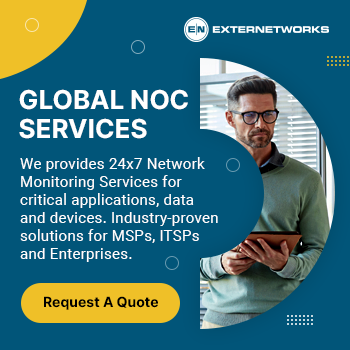The Role of Managed IT Services in Supporting Remote Work and Collaboration

Do you need help managing the IT needs of your remote workforce? In the current changing times, many companies need more flexibility in their operations and how they manage and maintain their IT infrastructure.
Managed IT services are increasingly important in providing support for businesses that use remote work and collaboration. As digital innovation continues to evolve, more companies are turning to managed service providers (MSPs) to simplify how they manage their technology and keep them on track.
Managed IT services offer several key advantages for businesses transitioning to a remote working environment. They can help organizations stay competitive by providing cost savings, enhanced security measures, improved management processes, and increased productivity all of which are important considerations for any businesss bottom line. This article explores the different roles that Managed IT services can play in supporting remote work and collaboration.
What are Managed IT Services?
Managed IT services are a type of outsourced IT support that provides businesses with the technical expertise and resources needed to maintain their IT infrastructure. Managed services can include everything from network monitoring and maintenance to data backup and disaster recovery. By outsourcing these tasks, businesses can free up internal resources for more strategic initiatives while ensuring their systems remain secure and reliable.
The Role of Managed IT Services in Supporting Remote Work and Collaboration
Network and Infrastructure Support
Providing secure remote access to company resources
Managed IT services can help organizations support remote work and collaboration by providing network and infrastructure support. This includes setting up secure networks, configuring firewalls, managing access control, and ensuring that all systems are up to date with the latest security patches. Managed IT services can also provide proactive monitoring of networks to identify potential threats before they become a problem.
Virtual private networks (VPNs)
VPNs are an essential component of managed IT services for remote work and collaboration. A VPN allows users to securely access a private network from anywhere in the world, allowing them to access company resources such as files, applications, and other data. This is especially important for businesses collaborating with remote employees or partners. With a VPN, users can securely share sensitive information without worrying about it being intercepted by malicious actors. Additionally, VPNs can securely connect multiple offices, allowing for seamless collaboration between remote teams.
Cloud-based solutions for file sharing and collaboration
By leveraging cloud-based solutions, businesses can ensure that their employees have access to the tools they need to stay connected and productive while working from home. Cloud-based file-sharing and collaboration solutions allow teams to securely store, share, and collaborate on documents, spreadsheets, presentations, and other files. These solutions also provide real-time updates, so everyone is always working on the most up-to-date version of a document.
Additionally, cloud-based solutions can be accessed from anywhere with an internet connection, making it easy for remote teams to stay connected and productive.
Ensuring reliable internet connectivity for remote workers
One of the most important aspects is providing reliable internet connectivity for remote workers. Managed IT services can help ensure remote workers have access to the necessary bandwidth, speed, and reliability needed to support their work activities. This includes setting up secure virtual private networks (VPNs) and other network infrastructure solutions to ensure that remote workers can access the resources they need.
Cybersecurity for Remote Work
Protecting against cyber threats such as phishing and malware
Managed IT services can play a critical role in protecting remote workers and their data from cyber threats. Managed IT services can help organizations protect against phishing attacks, malware, ransomware, and other malicious activities by providing comprehensive security solutions. Managed IT services can also provide employees access to secure networks and systems that are regularly monitored for suspicious activity. Additionally, managed IT services can help organizations implement policies and procedures to ensure that remote workers follow best cybersecurity practices.
Multi-factor authentication
With more employees working remotely, it is essential to ensure that their data and systems are secure from malicious actors. Managed IT services can provide multi-factor authentication (MFA) solutions to help protect against unauthorized access. MFA requires users to provide two or more pieces of evidence to verify their identities, such as a password and a one-time code sent to their mobile device. This helps ensure that only authorized users can access the system.
Regular security assessments and penetration testing
Managed IT services can help organizations ensure that their remote work and collaboration systems are secure. Regular security assessments and penetration testing can identify potential vulnerabilities in the system, allowing organizations to take proactive steps to protect their data and networks. Additionally, managed IT services can provide ongoing system monitoring for any suspicious activity or changes in user behavior. This helps organizations avoid potential threats and respond quickly to security incidents.
Collaboration Tools
Providing access to video conferencing and communication tools
Managed IT services can help ensure that employees can stay connected while working remotely by providing access to video conferencing and communication tools. This is especially important for teams that need to collaborate on projects or tasks, as it allows them to share ideas and work together without being physically present.
Facilitating team collaboration and communication
By providing access to the right tools, managed IT services can help teams stay connected and productive even when they are not physically together. One of the most important tools for remote collaboration is a suite of communication and collaboration tools. These include video conferencing, instant messaging, file sharing, and project management tools. By providing access to these tools, managed IT services can help teams stay connected and collaborate effectively even when they are not in the same room.
Ensuring compatibility with other collaboration tools and platforms
Providing access to the latest collaboration tools, managed IT services can ensure that teams are able to communicate and collaborate effectively. Additionally, managed IT services can help ensure that these tools are compatible with other platforms and systems the organization uses. This helps to reduce the risk of data loss or disruption due to incompatibility issues.
Helpdesk support
Providing remote technical support for remote employees
With the right managed IT services, organizations can ensure that their remote employees can access the technical support they need to stay productive and connected. Helpdesk support is one of the most important managed IT services for remote employees. Helpdesk support provides remote employees with access to technical assistance when they encounter problems with their computers or other devices. Helpdesk support can help remote employees troubleshoot issues, install software, and configure settings to ensure that their devices are working properly.
Troubleshooting and resolving technical issues remotely
With the rise of remote work, businesses must ensure that their employees have access to reliable technology and support when working from home or other locations. Managed IT services provide helpdesk support for troubleshooting and resolving technical issues remotely. This helps reduce downtime and ensures that employees can collaborate effectively even when they are not in the office.
Providing training and support for remote employees to help them work effectively
Training and support for remote employees is essential to ensure they can work effectively. Managed IT services can offer a range of resources to help remote employees become more productive, including online tutorials, webinars, and one-on-one support. These resources can help employees learn how to use the tools they need to collaborate with colleagues, access files remotely, and stay connected with their team.
Data Backup and Disaster Recovery
Regular backups of critical data
Managed IT services can help organizations ensure that their data is regularly backed up and protected from potential disasters. This includes both on-site and off-site backups, as well as cloud-based solutions. By having a reliable backup system in place, organizations can rest assured that their data will remain safe even if something unexpected happens.
Off-site storage of backup copies
One of the key areas is data backup and disaster recovery. With managed IT Services, businesses can ensure that their data is securely backed up off-site so that it can be quickly recovered in the event of a disaster. This helps to minimize downtime and disruption, allowing employees to continue working remotely without interruption.
Rapid recovery in case of a disaster or system failure
In the event of a system failure or disaster, managed IT services can quickly restore the system to its previous state, minimizing downtime and disruption to business operations. This helps to ensure that remote workers can continue to collaborate and work efficiently, even in the face of unexpected challenges.
In-Conclusion, Managed IT services have become increasingly crucial for businesses that are looking to support remote work and collaboration. Managed IT providers can help businesses ensure their systems are secure, reliable, and up-to-date by providing a comprehensive suite of services. This helps to ensure that employees can access the resources they need from anywhere in the world while also helping to protect sensitive data from malicious actors. Additionally, managed IT services can help businesses streamline their operations and reduce costs by providing a single contact for all IT-related needs.
Finally, managed IT services can help businesses ensure that their remote work and collaboration efforts comply with applicable laws and regulations. By leveraging the expertise of a managed IT provider, businesses can be sure that they are taking the necessary steps to protect their data and ensure the success of their remote work and collaboration efforts.
Why Choose Us
ExterNetworks is a leading managed IT services provider that offers comprehensive solutions for businesses of all sizes. With our team of experienced professionals, we provide businesses with the expertise and resources necessary to keep their systems running smoothly and efficiently. We understand that every business is unique and has different IT needs, so we offer customized solutions tailored to meet your specific requirements. We offer a wide range of services, including cloud computing, network security, data backup and recovery, system monitoring, and more. Our team is dedicated to providing businesses with the best possible service and support, so you can rest assured that your IT infrastructure is in good hands.
Also Read
What are Managed IT Services and Why do Businesses Need Them?
Common IT Challenges That Managed IT Services Can Help Solve
The Benefits of Partnering with a Managed IT Service Provider
How to Choose the Right Managed IT Service Provider for Your Business





